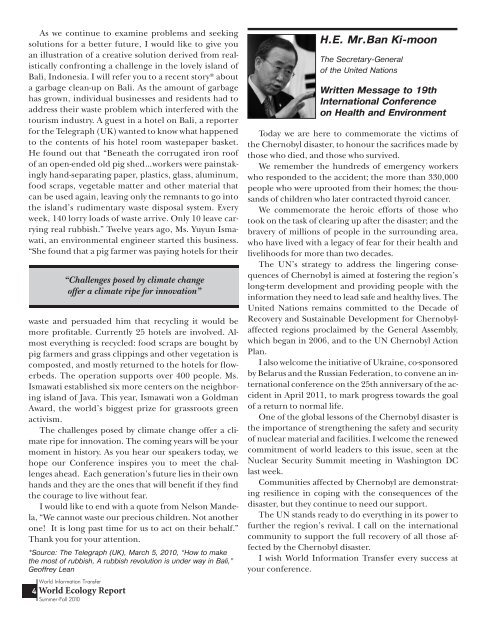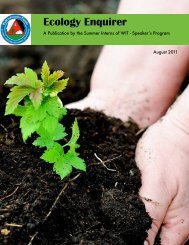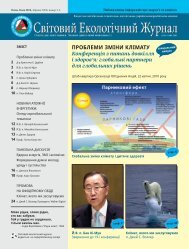V. XXII No 2, 3 - World Information Transfer
V. XXII No 2, 3 - World Information Transfer
V. XXII No 2, 3 - World Information Transfer
You also want an ePaper? Increase the reach of your titles
YUMPU automatically turns print PDFs into web optimized ePapers that Google loves.
As we continue to examine problems and seekingsolutions for a better future, I would like to give youan illustration of a creative solution derived from realisticallyconfronting a challenge in the lovely island ofBali, Indonesia. I will refer you to a recent story* abouta garbage clean-up on Bali. As the amount of garbagehas grown, individual businesses and residents had toaddress their waste problem which interfered with thetourism industry. A guest in a hotel on Bali, a reporterfor the Telegraph (UK) wanted to know what happenedto the contents of his hotel room wastepaper basket.He found out that “Beneath the corrugated iron roofof an open-ended old pig shed…workers were painstakinglyhand-separating paper, plastics, glass, aluminum,food scraps, vegetable matter and other material thatcan be used again, leaving only the remnants to go intothe island’s rudimentary waste disposal system. Everyweek, 140 lorry loads of waste arrive. Only 10 leave carryingreal rubbish.” Twelve years ago, Ms. Yuyun Ismawati,an environmental engineer started this business.“She found that a pig farmer was paying hotels for their“Challenges posed by climate changeoffer a climate ripe for innovation”waste and persuaded him that recycling it would bemore profitable. Currently 25 hotels are involved. Almosteverything is recycled: food scraps are bought bypig farmers and grass clippings and other vegetation iscomposted, and mostly returned to the hotels for flowerbeds.The operation supports over 400 people. Ms.Ismawati established six more centers on the neighboringisland of Java. This year, Ismawati won a GoldmanAward, the world’s biggest prize for grassroots greenactivism.The challenges posed by climate change offer a climateripe for innovation. The coming years will be yourmoment in history. As you hear our speakers today, wehope our Conference inspires you to meet the challengesahead. Each generation’s future lies in their ownhands and they are the ones that will benefit if they findthe courage to live without fear.I would like to end with a quote from Nelson Mandela,“We cannot waste our precious children. <strong>No</strong>t anotherone! It is long past time for us to act on their behalf.”Thank you for your attention.*Source: The Telegraph (UK), March 5, 2010, “How to makethe most of rubbish, A rubbish revolution is under way in Bali,”Geoffrey Lean<strong>World</strong> <strong>Information</strong> <strong>Transfer</strong>4 <strong>World</strong> Ecology ReportSummer-Fall 2010H.E. Mr.Ban Ki-moonThe Secretary-Generalof the United NationsWritten Message to 19thInternational Conferenceon Health and EnvironmentToday we are here to commemorate the victims ofthe Chernobyl disaster, to honour the sacrifices made bythose who died, and those who survived.We remember the hundreds of emergency workerswho responded to the accident; the more than 330,000people who were uprooted from their homes; the thousandsof children who later contracted thyroid cancer.We commemorate the heroic efforts of those whotook on the task of clearing up after the disaster; and thebravery of millions of people in the surrounding area,who have lived with a legacy of fear for their health andlivelihoods for more than two decades.The UN’s strategy to address the lingering consequencesof Chernobyl is aimed at fostering the region’slong-term development and providing people with theinformation they need to lead safe and healthy lives. TheUnited Nations remains committed to the Decade ofRecovery and Sustainable Development for Chernobylaffectedregions proclaimed by the General Assembly,which began in 2006, and to the UN Chernobyl ActionPlan.I also welcome the initiative of Ukraine, co-sponsoredby Belarus and the Russian Federation, to convene an internationalconference on the 25th anniversary of the accidentin April 2011, to mark progress towards the goalof a return to normal life.One of the global lessons of the Chernobyl disaster isthe importance of strengthening the safety and securityof nuclear material and facilities. I welcome the renewedcommitment of world leaders to this issue, seen at theNuclear Security Summit meeting in Washington DClast week.Communities affected by Chernobyl are demonstratingresilience in coping with the consequences of thedisaster, but they continue to need our support.The UN stands ready to do everything in its power tofurther the region’s revival. I call on the internationalcommunity to support the full recovery of all those affectedby the Chernobyl disaster.I wish <strong>World</strong> <strong>Information</strong> <strong>Transfer</strong> every success atyour conference.




